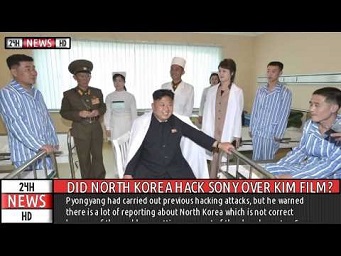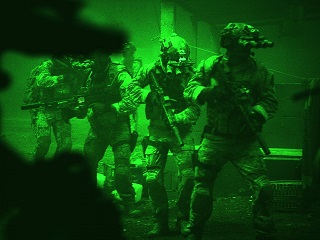US stokes conflict with North Korea over Sony hacking
The US government is preparing to retaliate against North Korea for its alleged role in the hacking attack on Sony Pictures, Obama administration officials said Thursday. While declining to go on the record placing responsibility on North Korea for the hacking—likely in part because they can produce no evidence—several top officials suggested that US cyberwarfare countermeasures were already in preparation.
White House press spokesman Josh Earnest said Thursday that he would not name North Korea as the perpetrator of the Sony hacking in advance of investigations by the FBI and Justice Department, but added that the cyberattack was an example of “destructive activity with malicious intent that was initiated by a sophisticated actor.” US officials considered the hacking a “serious national security matter” and “would be mindful of the fact that we need a proportional response,” he said.
The secretary of the Department of Homeland Security, Jeh Johnson, told a television interviewer Thursday morning that the administration was “actively considering a range of options that we’ll take in response to this attack.” He did not rule out military force, although Earnest’s reference to a “proportionate response” was portrayed by the US media as a threat of some form of electronic sabotage, rather than a direct military attack on North Korea.
The last two days have seen the transformation of the Sony incident from a corporate scandal—with the private information of tens of thousands of current and former employees dumped onto the Internet—into a far more sinister affair, involving US threats against both North Korea and China.
Beginning November 24, anonymous hackers, calling themselves “Guardians of Peace,” have made several dumps of internal Sony information on the Internet, demanding the studio shelve its film The Interview, a comedy whose plot is based around the CIA hiring two American journalists (played by Seth Rogen and James Franco) to assassinate North Korean leader Kim Jong-un.
This week the affair escalated with vague threats of violence against theaters that showed the film, scheduled to open on December 25. On Wednesday morning, the four largest US theater chains cancelled the premieres, citing the threats, and Sony then withdrew the film from circulation entirely.
The US National Security Council then issued its first formal statement, not naming North Korea, but noting that the White House had offered Sony Pictures its support against the apparent cyberattack. The statement declared: “We know that criminals and foreign countries regularly seek to gain access to government and private sector networks—both in the United States and elsewhere ... The US government is working tirelessly to bring the perpetrators of this attack to justice and we are considering a range of options in weighing a potential response.”
Obama administration officials made unattributed statements to the US media Wednesday asserting that North Korea was responsible for the attacks on Sony, setting off a media frenzy, including speculation about possible cyberwarfare or military responses against the regime in Pyongyang. This was accompanied by suggestions that Iran was a co-conspirator in the cyberattacks, in retaliation for US and Israeli cyberwarfare against Iran’s nuclear energy facilities.
No evidence of any kind has been produced, with press reports limited to suggestions that some of the code in the malware used to infect Sony’s corporate computer system had been written in Korean, and that the code resembled that used in previous cyberattacks in South Korea and Saudi Arabia.
The United States, moreover, is heavily invested in cyberwarfare measures, particularly targeting China. Earlier this year, NSA whistleblower Edward Snowden revealed extensive offensive cyberwarfare measures, including attacks on government and military targets.
There is evidence as well that the US is whipping up conflict with North Korea in several arenas simultaneously. The escalation of the Sony Pictures affair coincided with the issuance of a report Tuesday by a United Nations committee recommending that North Korean officials be referred to the International Criminal Court for human rights violations.
On Thursday, just as the White House spokesman was threatening a “proportionate response” to the Sony hacking, the UN General Assembly approved the referral of North Korea to the ICC, sending it on to the UN Security Council, where Russia and China are expected to block further action.
The role of Sony Pictures also deserves serious scrutiny. The studio has a documented close relationship with the CIA, having made the film Zero Dark Thirty in 2012, in direct collaboration with the agency, portraying CIA torture of prisoners as vital to the targeting of Osama bin Laden by a Navy Seals death squad the previous year. The film served as a sort of video rebuttal-in-advance of the Senate Intelligence Committee report on CIA torture, which was completed in the summer of 2012 but delayed for two years by the Obama White House, until it was made public, in heavily redacted form, last week.
The decision to make a film that climaxed in the assassination of Kim Jong-un was peculiar, to say the least. As the New York Times wrote, “To depict the killing of a sitting world leader, comically or otherwise, is virtually without precedent in major studio movies, film historians say.” If North Korea, Iran or Russia had produced a similar film about a plan to murder Obama, complete with grisly images of the president being obliterated by a missile (the final scene in The Interview), the US government and media would have raised an uproar.
Moreover, given the Obama administration’s claim that the president has the right to order drone missile assassination of any individual on the planet, including US citizens, at his own discretion, the depiction of such an attack by a major American film studio could well be seen as a veiled threat. There is no doubt that there were elements in the American government, aware of the mounting crisis and isolation of the North Korean dictatorship, who fully expected the film to be interpreted in that way in Pyongyang.
According to a report carried by the official US broadcast service Voice of America, State Department spokeswoman Jennifer Psaki confirmed that the US diplomat who is coordinating the anti-China campaign, Daniel Russel, “had held a routine meeting with Sony executives to discuss foreign policy in Asia.” The online publication Daily Beast said it had seen emails indicating that at least two US officials had prescreened The Interview and gave it their blessing.
The investigation into the Sony hacking is being coordinated by the FBI and the Mandiant forensics unit of FireEye Inc. This is the same private company that was the source of a series of reports, published in the New York Times and embraced by the Obama administration, alleging that a Chinese Army unit specializes in hacking US corporate and government computer systems.
The campaign against North Korea could be transformed relatively quickly into another element in the Obama administration’s ongoing effort to mobilize US military and security resources against China.
_________________________________________________________________________________________
Source: WSWS. URL: http://www.a-w-i-p.com/index.php/2014/12/19/us-stokes-conflict-with-north


























